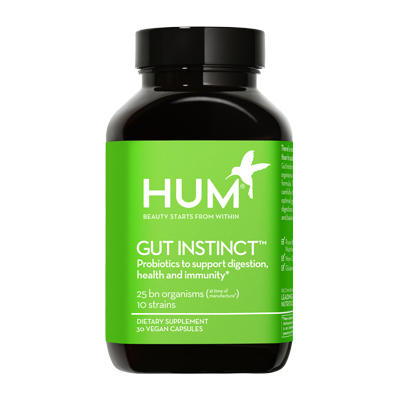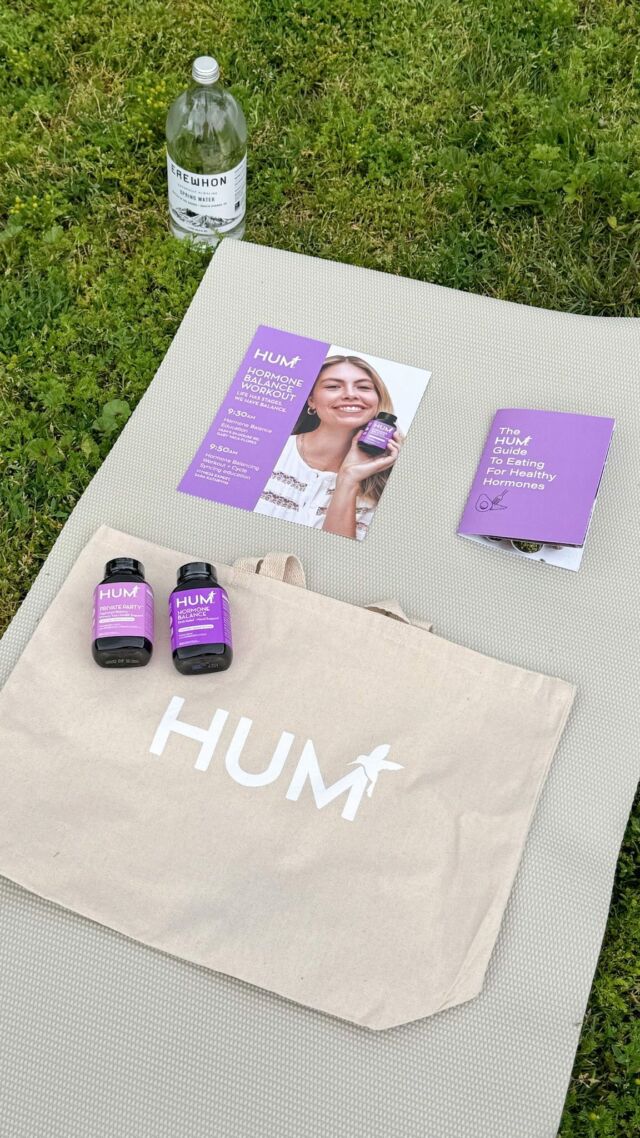Meeting with a nutrition expert? Gaby Vaca-Flores, RDN, CLE, outlines seven smart questions to ask a dietitian.
Whether it’s virtually or in-person, everyone can benefit from meeting with a dietitian. At HUM, we provide free access to a personal dietitian to consult with after completing our nutrition assessment quiz. But what does working with a dietitian entail exactly?
A dietitian can help you reach your nutrition goals, help you recognize any blind spots in your current diet, or help you improve your relationship with food. But in order to do this, they’ll need to understand where you’re currently at and what your goals are. Optimizing your conversation with an RD can be as easy as preparing questions early to help them get the best insight on your goals. In fact, asking the right type of questions can sometimes make the difference between leaving the discussion feeling empowered versus somewhat confused. Ready to get started? Here are 7 good questions to ask a dietitian.
How Can A Dietitian Help Me?
You might be wondering: If the dietitian is the expert, why should I come prepared with my own questions?
Ultimately, there are a few compelling advantages to having your own set of questions prepared for your chat with an RD.
- Gain clarity. Asking your burning questions to an expert can help demystify any confusing topics like diets, supplements, and healthy versus unhealthy ingredients. It’s a great time to address any food myths you’ve heard (like those around plant-based diets, for example).
- Improve results. Diet is deeply personal. By asking personal questions, a dietitian can better understand your goals, hesitations, and everything in between. The more insight your dietitian has on your specific needs, the more personalized your nutrition prescription will be. Hence, better results!
- Save time. If you have limited time to talk with your RD, having your list of questions on hand will ensure you can get the most out of your session. To save even more time, consider sending your list of questions to your RD in advance.

How Do I Prepare For a Dietitian Appointment?
Before getting to the best questions to ask a dietitian, here are some preliminary steps to take to better guide your consultation.
The first and most important step is to reflect on your goals. Your goals don’t have to be limited to healthy eating. Personal objectives can range from improved energy and mental clarity to better digestion, for example.
Next, take a moment to reflect on any challenges that may be getting in the way of your goals. This can include social pressure, personal discipline, lack of resources, or a new routine, like after giving birth or starting a new job.
Center your questions around your goal and challenges alike. For example, if your goal is to eat more whole foods and less processed foods, some of the best questions to ask might include:
- What’s the difference between whole and processed foods?
- Is my protein powder considered a whole food?
- How do I start meal prepping?

7 Popular Questions to Ask a Dietitian
Here are some of the best questions to ask a dietitian.
1. I’m thinking about trying this diet. What do I need to know?
I highly recommend asking your RD this question before starting a new diet. Dietitians are well versed in (most) popular diets—especially since there are so many fad diets floating around on social media.
Keep in mind: You’re not asking for the RD’s opinion on this diet. Instead, you’re asking your RD for the information you need to follow the diet in the healthiest way possible and in respect to your goals.
Depending on your goals, your RD will likely help tailor your food intake to align with your lifestyle, eating habits, and activity level.
2. What supplements should I take?
Rather than spending countless hours trying to research which supplements are right for you, let your dietitian do the hard work for you.
At HUM, you can start by taking a quick 3-minute quiz to get personalized vitamin recommendations from the pros. After that, we’ll pair you with a personal dietitian to help further curate your results and to answer any other questions you have.
Your RD has the skillset to look at all of the moving parts of your life, such as your:
- Goals
- Nutrient intake
- Activity level
- Daily schedule
All of this information enables your dietitian to make the best recommendations. More importantly, they can help ensure that you’re taking safe, high-quality supplements.
If you already take supplements, a good follow-up question would be to ask if your current supplement routine is appropriate for your goals and/or concerns. Make sure you come prepared with the name or brand of every supplement you take and know the dosage. Pro tip: Write it all down and bring the list with you or snap a photo of your medicine cabinet.

3. How do I stick to my meal plan when I hang out with friends?
Dietitians are trained to counsel clients on more than just food. Your RD is happy to talk to you about finding motivation for change, responding to daily stressors, and social pressures as they relate to reaching your healthy lifestyle.
Navigating environments where you have little to no control—like eating out with friends—is challenging, but rest assured that your dietitian can help. Whether it’s tips on learning how to select balanced meals from a menu, exploring healthier cocktail options, or brainstorming ideas for non-food-related outings, your RD can be a great resource for tackling social outings.
4. How do I read nutrition labels?
One way to ensure you’re being mindful about your consumption is to check nutrition labels. But often, they can be confusing.
Our advice? Check the ingredient list down at the bottom of the label. For example, if sugar is listed as the first ingredient (meaning it’s the predominant ingredient in the food), you’ll know it’s a food to enjoy in moderation. On the other hand, if a whole food is listed as the primary ingredient, you know it’s providing beneficial nutrients.
Nutrition labels can also help you understand the breakdown of nutrients. For example, fiber is a type of carbohydrate. But since your body can’t digest it, it doesn’t affect your blood sugar levels. To get the most accurate information, subtract the grams of fiber from the total carbohydrates on a nutrition label.
If you’re concerned about specific ingredients, consult your RD—they love debunking myths around popular or taboo ingredients. In most cases, your RD should be able to provide you with science-backed information that supports or warns against certain ingredients.
If it’s an ingredient you should steer clear of, your dietitian can also help you identify it in your daily diet and suggest practical alternatives.
5. Should I track my calories? How many calories should I eat daily?
There’s no one-size-fits-all answer to this question. That’s why it’s important to ask your personal dietitian to calculate your estimated energy needs.
Additionally, your dietitian can help determine if counting calories will be a helpful strategy for your specific goals and lifestyle.
For some, estimating portions or following a plate diagram may be more helpful than tracking every bite. For others, practicing mindful eating may be more productive. More importantly, your dietitian can make sure that you’re consuming enough calories to prevent malnutrition while simultaneously working to achieve your goals.

6. How can I get my family to eat more vegetables?
Dietitians understand that for many clients with families, you’re not just feeding yourself, but also cooking dinners, packing lunches, and helping keep your entire family healthy. Sharing details and asking specific questions centered around getting family members to eat healthier is perfect for gaining actionable advice from your RD. In fact, your dietitian will likely have age-appropriate tips (for any little ones who may not love veggies), fun and engaging family food activities, tips for cooking for meat-eaters and plant-based eaters, and recipe ideas that you can take home and apply.
7. I experience indigestion/constipation/heartburn regularly. Why?
Nutrition and digestion go hand in hand. For that reason, it’s essential to detail any digestive discomforts that you experience during or after eating.
Your RD can help identify dietary triggers, food sensitivities, and possible food intolerances. Your dietitian can help create a customized meal plan that honors both your tastebuds and digestive comfort. Or, they may be able to help guide you through an elimination diet to find out exactly what’s causing your digestion issues. Plus, they might be able to suggest supplements to help your digestion, like HUM Nutrition’s Gut Instinct, which features a blend of probiotics to aid digestion.
When to Consult Your Doctor
Some questions should be addressed by your doctor before seeing a dietitian. This is especially important if your dietitian doesn’t have access to your past medical history.
This step will apply to you if you:
- Take prescription medication
- Have underlying medical issues
- Are preparing for or recovering from surgery
- Are pregnant or nursing
The Bottom Line
You can optimize your conversations with your dietitian simply by asking strategic questions. Start by setting goals and identifying the most pressing challenges. From there, create a list of questions and let the dietitian do the rest!











